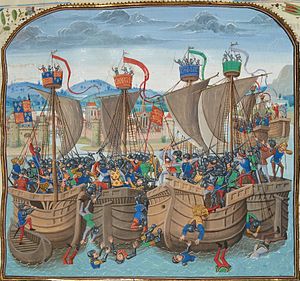Battle of L'Espagnols-sur-Mer
| Battle of Les Espagnols sur Mer | |||||||
|---|---|---|---|---|---|---|---|
| Part of the Hundred Years' War | |||||||
 A depiction of medieval naval combat from Jean Froissart's Chronicles, 14th century |
|||||||
|
|||||||
| Belligerents | |||||||
|
|
|
||||||
| Commanders and leaders | |||||||
|
|
|
||||||
| Strength | |||||||
| 50 ships | 40 ships | ||||||
| Casualties and losses | |||||||
|
At least 2 ships lost The human casualties were high, higher than the Castilians |
14-26 ships captured | ||||||
Coordinates: 50°52′26″N 0°49′01″E / 50.874°N 0.817°E
At least 2 ships lost
The Battle of Les Espagnols sur Mer ("the Spaniards on the Sea"), or the Battle of Winchelsea, was a naval battle that took place on 29 August 1350 and was a victory for an English fleet of 50 ships commanded by Edward III, with the Black Prince, over a combined Castilian and Genoese fleet of 44 much larger vessels commanded by Don Carlos de la Cerda. Between 14 and 26 Castilian ships were captured, and some were sunk, while 2 English vessels were sunk and many suffered heavy losses.
Throughout the early part of Edward III's reign England shores were harassed by pirates. This remained one of the major incentives for the king's expansion of the Royal Navy and merchant shipping regulations. The records are scanty but they show a pattern of raiding and piracy that the king and parliament abhorred. In the north Scots sea rovers attacked the village of Scarborough and took vessels away. But in November 1349, Don Carlos de la Cerda, son of Don Luis captured several English ships laden with wine from Bordeaux, and murdered the crews. De la Cerda redoubled his efforts the following year entering Sluis to load up with merchandise before returning to Corunna. He loaded up with weapons of warfare - artillery, missiles, crossbows, longbows, soldiers and archers anticipating an English reprisal attack. More serious attempts were made by Castilians to raid Calais and 'freebooters' plundered the town leaving it in dire circumstances. A planned French assault on the garrison was apprehended for 2 January 1350, but an expedition under Sir Walter Manny foiled the attempt. The town was in a desperate state of near starvation when in 1347 the Governor had sent out a Genoese Master Mariner with an urgent message for the king of England to come to their aid. In Scotland, the English had captured King David II whose ransom would lead the French into an alliance, whilst Edward's recent string of victories put him in a much stronger position to wage war on his enemies.
...
Wikipedia
